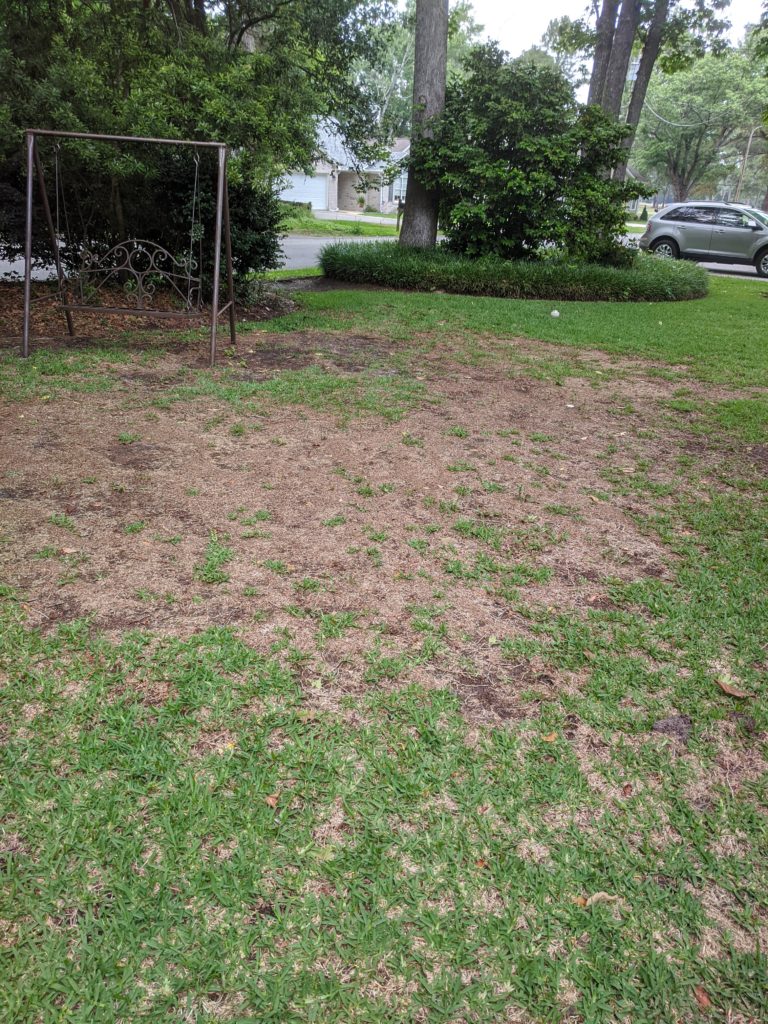Locals see it time and again. After investing heavily and working diligently, those weeds and brown patches simply reappear.
This leads to a myriad of questions. Is it my irrigation system? Is it my soil? Is my grass type compatible with this soil? What am I doing wrong here?
BEFORE TOP HAT SOIL

Lawn care mowers offer minimal help. Few have the knowledge necessary to understand the core issues. And the big box home improvement stores provide little to no support.
Says North Myrtle Beach local resident Bobbie Kay, “It was a mess. I did everything possible that I knew how to do. I called Todd Stephenson about a tree in our yard. He said it might make it. It might not, but what about this lawn?”
“He told me about this new process he had. I know how important mulch is for flower beds, so I decided why not give it a try on this grass? It has improved my grass 95%! It’s just wonderful.” said Kay
Todd explains the process in the short video above.
What is Grass, Turf, Nutrients and Soil?
According to LawnLove.com, there are over 12,000 species of grass around the world and dozens of them can be found in different regions of the United States. If you want to have a lush, green, healthy lawn, then a proper maintenance routine is necessary.
Your lawn’s health depends on how you treat your grass in addition to other factors such as your region, its soil, and climate.
Turf types often seen in our area include:
Centipede grass, common bermudagrass , cultivars of hybrid bermudagrass that include Tifgreen, Tifway II, and Santa Ana. St. Augustine grass is another local favorite.
Dichondra is more rare locally, but can be found in some yards. Dichondra is not a turf grass but a low-growing perennial. It will grow in partial shade, but it does best in full sun under cool coastal conditions. Mowing dichondra is a matter of personal preference. It may either remain un-mowed or be mowed. Dichondra has a deep root system when properly irrigated. Frequent irrigation to maintain dichondra increases weed invasion. It is also very susceptible to flea beetles and nematode injury. For these reasons, Dichondra is not as popular as other varieties.
Todd Stephenson of Top Hat explains the requirements for maintaining healthy grass, soil, nutrients, and care in the short video above. Viewers can also hear a testimonial from a North Myrtle Beach customer.
SOIL TYPES
There are six main soil groups: clay, sandy, silty, peaty, chalky and loamy. They each have different properties.
It is best to hire a local expert, like Top Hat Plant and Turf Health Services who can navigate you through the process of making the best choices for your particular soil type.
NUTRIENT PROCESS
There are three top nutrients grass needs to grow; potassium, nitrogen, and phosphorus. Though all plants need these three key nutrients to thrive, grass requires higher concentrations for proper growth.
It is the wise application and appropriate mixture of the above that matters most. This process will be different depending on your soil type, grass type, climate, amount of shade or amount of sun.
Top Hat takes the experimentation and guesswork out of the process for the homeowner.
What are the Benefits of Grass & Turf?
According to NPS.gov: (The National Parks Service)
The Benefits of Turf Grass include
- Turfgrass Reduces Runoff
- Turfgrass Prevent Erosion
- Turfgrass Replenishes Air
- Turfgrass Promotes Safety
- Turfgrass Regulate Temperature
- Turfgrass Supports Bioremediation
- Turfgrass Sequesters Carbon
- Turfgrass Helps with Noise
Conclusion: The Importance of getting professional help for your lawn
Locals find that it actually costs less to hire a turf expert like Todd. Experimenting in the unknown often creates more complications and more damage.
Top Hat Plant and Turf Health Services can be reached at 843-651-8733 or by visiting the highlighted website listed here.

